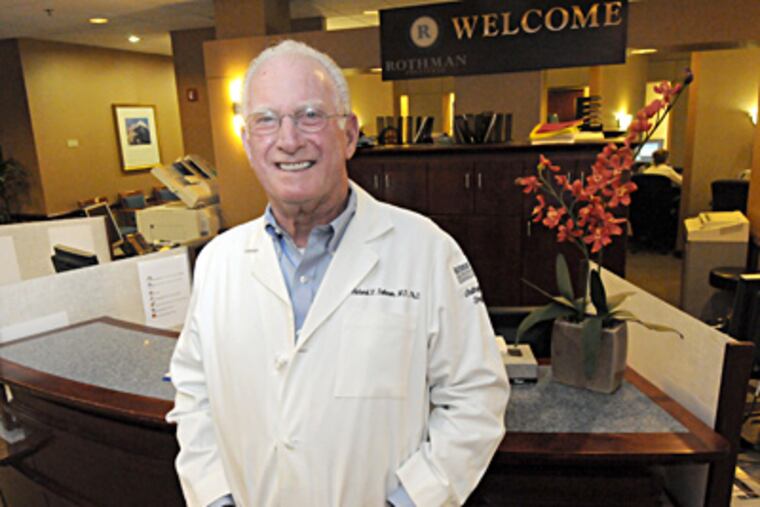Rothman Institute continues its growth spurt into the suburbs
The leadership team at the Rothman Institute, already the biggest orthopedic group in the Philadelphia region, is convinced that it has to keep growing to stay on top as the health-care system evolves to where payments to doctors and hospitals are based on quality, and real-time information is essential to success.

The leadership team at the Rothman Institute, already the biggest orthopedic group in the Philadelphia region, is convinced that it has to keep growing to stay on top as the health-care system evolves to where payments to doctors and hospitals are based on quality, and real-time information is essential to success.
"You need a critical mass to have good business systems, particularly with the demands for information from Obamacare and regulations," institute founder Richard Rothman said in an interview last week. "It is virtually impossible to be a small health-care organization and successfully follow all the mandates."
With 105 doctors and 14 locations in the region, the Rothman Institute has doubled in size in the last five years, said company president Todd J. Albert, who is also a spine surgeon and chair of the department of orthopedic surgery at Jefferson Medical College.
And there are no signs of slowing. This summer, the institute is adding nine-physician, Main Line Health-affiliated Orthopedic Specialists L.L.C. in Bryn Mawr. It also is buying a 35 percent stake in Physicians Care Surgical Hospital in Limerick and bringing on three doctors at Phoenixville Orthopedic Associates who started the hospital.
The deals expand the Rothman Institute's coverage of Philadelphia's suburbs. Come fall, the private company, which does not disclose financial information, plans to open a 15th location in the Newtown-Yardley area.
"I'm very impressed with what they are doing. They are a leading-edge orthopedics company at this point," said Daniel M. Grauman, president and chief executive of DGA Partners, a health-care consulting firm in Bala Cynwyd.
"They are forward-thinking, they are aggressive, they are entrepreneurial," said Grauman, though he is not convinced that specialty hospitals will get large volumes of patients in the long term. The institute already owns Rothman Specialty Hospital in Bensalem. Despite Grauman's reservations, adding a second hospital could be a boon for Rothman because the Affordable Care Act prohibited the opening of new physician-owned hospitals and blocked the expansion of those that were approved by the December 2010 deadline. Though Jefferson, where Rothman moved his practice in the mid-1990s, remains home base for the Rothman Institute, the company now has numerous relationships with health systems such as Kennedy and AtlantiCare in South Jersey, as well as Catholic Health East and Main Line Health in Pennsylvania.
Jefferson has no ownership stake in the institute, Richard Rothman said, but it owns 15 percent of the Bensalem hospital. Rothman owns 64 percent of it; Holy Redeemer Health System owns 5 percent, and Nueterra Healthcare, which manages physician-owned hospitals, owns the rest.
For AtlantiCare, which operates hospitals in Atlantic City and Pomona, it made sense to team up with Rothman, said Donna Howell, the system's assistant vice president for operative invasive services.
"A lot of our joint-replacement patients were leaving the area for joint replacement. They were going to Philadelphia," she said. Now, Rothman has about 85 percent of the system's orthopedics business, she said.
A desire to expand the institute's relationship with Main Line Health was a big driver in the planned purchase of Orthopedic Specialists in Bryn Mawr.
"We're the vast majority of orthopedics at Riddle [Hospital]. We'll now be 85 percent of orthopedics at Bryn Mawr," Albert said. "It's important for our strategy going forward for us to be able to provide the breadth of orthopedics in the health system."
Rothman doctors also operate at Lankenau, and the Orthopedic Specialists deal will get Rothman into Paoli Hospital for the first time. Being in all four Main Line Health hospitals is especially important if the system adopts the so-called accountable-care model, which means they would take on financial responsibility for the care of certain populations and would likely lose money on poor-quality care.
From Orthopedic Specialists' perspective, the deal was a way to tap into Rothman's substantial investments in measuring quality.
"So much of what is coming in the future of medicine will be tied to measuring how our patients do," said Robert P. Good, the group's founder.
"We don't have objective information on how we're doing. We think we're doing well," Good said. "Rothman is doing a good job of capturing that information."
A key detail, for example, is how well a replacement hip is functioning. "You have to be big enough to afford this kind of information-gathering technology," Good said.
In 2010, the Rothman Institute decided to spend $10 million over four years on information technology, said chief executive Michael E. West. It has invested in private software companies to improve the chances that it gets what it needs.
West's goal is to not just to measure how well replacement hips and knees are functioning over the long term, but also to integrate clinical and financial information to track, among other things, the productivity of exam rooms and physicians.
Gerald Katz, a Philadelphia-area health-care consultant, said West already has remarkable command of the numbers.
"He is formidable. I had dealings with him on behalf of a client. He's got the numbers down, much more than the hospitals do," said Katz. The Rothman group "can out-negotiate virtually any hospital because they have the numbers."